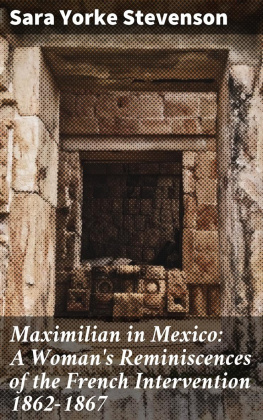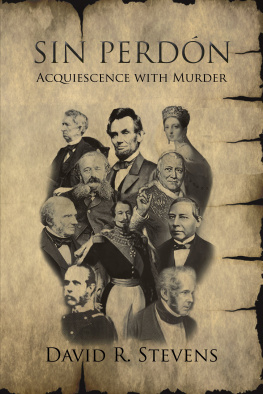Sara Yorke Stevenson - Maximilian in Mexico: A Womans Reminiscences of the French Intervention 1862-1867
Here you can read online Sara Yorke Stevenson - Maximilian in Mexico: A Womans Reminiscences of the French Intervention 1862-1867 full text of the book (entire story) in english for free. Download pdf and epub, get meaning, cover and reviews about this ebook. year: 2018, publisher: CreateSpace Independent Publishing Platform, genre: Detective and thriller. Description of the work, (preface) as well as reviews are available. Best literature library LitArk.com created for fans of good reading and offers a wide selection of genres:
Romance novel
Science fiction
Adventure
Detective
Science
History
Home and family
Prose
Art
Politics
Computer
Non-fiction
Religion
Business
Children
Humor
Choose a favorite category and find really read worthwhile books. Enjoy immersion in the world of imagination, feel the emotions of the characters or learn something new for yourself, make an fascinating discovery.
- Book:Maximilian in Mexico: A Womans Reminiscences of the French Intervention 1862-1867
- Author:
- Publisher:CreateSpace Independent Publishing Platform
- Genre:
- Year:2018
- Rating:3 / 5
- Favourites:Add to favourites
- Your mark:
- 60
- 1
- 2
- 3
- 4
- 5
Maximilian in Mexico: A Womans Reminiscences of the French Intervention 1862-1867: summary, description and annotation
We offer to read an annotation, description, summary or preface (depends on what the author of the book "Maximilian in Mexico: A Womans Reminiscences of the French Intervention 1862-1867" wrote himself). If you haven't found the necessary information about the book — write in the comments, we will try to find it.
Maximilian in Mexico: A Womans Reminiscences of the French Intervention 1862-1867 — read online for free the complete book (whole text) full work
Below is the text of the book, divided by pages. System saving the place of the last page read, allows you to conveniently read the book "Maximilian in Mexico: A Womans Reminiscences of the French Intervention 1862-1867" online for free, without having to search again every time where you left off. Put a bookmark, and you can go to the page where you finished reading at any time.
Font size:
Interval:
Bookmark:

A. The Bando Negro (Black Decree) Proclamation Of Emperor Maximilian,
October 3, 1865. 309
B. Treaty Of Miramar, Signed On April 10, 1864 .. 315
Frontsview Page
Napoleon III, Eugenie, And Duc De Morny .. 9
Maximilian Gold Coin 19
Agustin De Iturbide. 29
Miguel Miramon 39
President Benito Pablo Juarez.. 49
General Prim.. 59
Porfirio Diaz 69
Matias Romero.. 79
From "Mexico and The United States," by permission of G.P.Putnam's Sons.
Chapultepec, Maximilian's Palace. 89
Empress Charlotte. 99
Colonel Van Der Smissen 109
Marechal Bazaine And Madame La Marechale . 119
Matthew Fontaine Maury. 129
After a Photograph By D. H. Anderson.
Comte De Thun De Hohenstein.. 143
Photographed By Merille.
Count Von Funfkirkchen. 153
From Photograph By Montes De Oca.
Ex-Confederate Generals In Mexico 171
Dr. William M. Gwin. 183
From A Steel-Engraving By A. B. Walter For "The Democratic Review."
General Mejia. 195
Marquis De Gallifet. 211
After Photograph By Nadar.
Colonel Tourre, Third Zouaves. 227
After Photograph By Montes De Oca.
Comte De Bombelles. 239
After Photograph By Aubert & Co.
General Castelnau. 251
Colonel Dupin 263
Surrender of Maximilian, May 15, 1867 275
Don Pedro Rincon Gallardo. 283
From A Photograph By Cruces y Campa.
Guard And Sergeant Who Shot Maximilian .. 291
Last Day Of Maximilian. 297
The Calvary Of Queretaro, Showing Where Maximilian, Mejia, And Miramon
Were Shot 300
The Last Moments Of Maximilian. 301
The Hack In Which Maximilian Was Taken To The Place Of Execution..304
Monuments Marking The Place of Execution .. 307
Font size:
Interval:
Bookmark:
Similar books «Maximilian in Mexico: A Womans Reminiscences of the French Intervention 1862-1867»
Look at similar books to Maximilian in Mexico: A Womans Reminiscences of the French Intervention 1862-1867. We have selected literature similar in name and meaning in the hope of providing readers with more options to find new, interesting, not yet read works.
Discussion, reviews of the book Maximilian in Mexico: A Womans Reminiscences of the French Intervention 1862-1867 and just readers' own opinions. Leave your comments, write what you think about the work, its meaning or the main characters. Specify what exactly you liked and what you didn't like, and why you think so.






